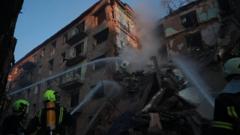As tensions rise in the Middle East, President Vladimir Putin's meeting with Iran's foreign minister reflects Russia's complex diplomatic relations amid the ongoing conflict involving Israel and Iran.
Putin's Diplomatic Balancing Act: Supporting Iran Amid Israel-U.S. Strikes

Putin's Diplomatic Balancing Act: Supporting Iran Amid Israel-U.S. Strikes
In a recent meeting, President Putin firmly expressed backing for Iran while maintaining a neutral stance towards U.S. and Israeli actions.
Throughout the escalating Israel-Iran conflict, President Putin publicly condemned Israel's military actions against Iran during a meeting with Iranian Foreign Minister Abbas Araghchi. This marked the first encounter between high-ranking officials from both nations since Israel commenced its military operations on June 13, which included targeting Iranian military installations and air defenses.
Despite Putin's visible support for Iran, he refrained from directly blaming Israel or the United States for their role in the hostilities. Instead, he characterized Israel's actions as "unprovoked aggression," emphasizing Russia's commitment to support the Iranian people. The delicate balancing act aims to maintain good relations with Iran while navigating the complex geopolitical landscape involving the U.S.
During discussions, Putin mentioned he had spoken with key leaders, including President Trump, suggesting Russia's interest in mediating peace efforts to reduce the flames of conflict. However, Kremlin spokesman Dmitri Peskov echoed Putin's cautious stance by emphasizing that support for Iran would depend on its needs, without committing to military or economic aid. This tone suggests a desire to keep avenues open for negotiation without escalating tensions in the already volatile region.
As both Israel and Iran continue their military posturing—Israel conducting airstrikes and Iran retaliating with missile strikes—Russia's approach demonstrates its overarching goal to position itself as an influential mediator, while simultaneously avoiding further entanglement in foreign conflicts that could detract from its focus on Ukraine.
With the backdrop of impactful international relationships at play and heightened military actions, the situation demands careful diplomatic maneuvering from all involved, as the world watches to see how the balance will play out.
Despite Putin's visible support for Iran, he refrained from directly blaming Israel or the United States for their role in the hostilities. Instead, he characterized Israel's actions as "unprovoked aggression," emphasizing Russia's commitment to support the Iranian people. The delicate balancing act aims to maintain good relations with Iran while navigating the complex geopolitical landscape involving the U.S.
During discussions, Putin mentioned he had spoken with key leaders, including President Trump, suggesting Russia's interest in mediating peace efforts to reduce the flames of conflict. However, Kremlin spokesman Dmitri Peskov echoed Putin's cautious stance by emphasizing that support for Iran would depend on its needs, without committing to military or economic aid. This tone suggests a desire to keep avenues open for negotiation without escalating tensions in the already volatile region.
As both Israel and Iran continue their military posturing—Israel conducting airstrikes and Iran retaliating with missile strikes—Russia's approach demonstrates its overarching goal to position itself as an influential mediator, while simultaneously avoiding further entanglement in foreign conflicts that could detract from its focus on Ukraine.
With the backdrop of impactful international relationships at play and heightened military actions, the situation demands careful diplomatic maneuvering from all involved, as the world watches to see how the balance will play out.























